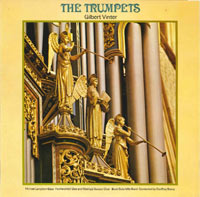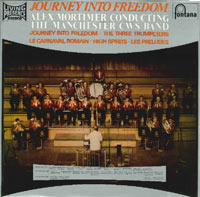Classic LPs - The 1960s
9-Apr-2008In the first of a new series, Tim Mutum looks closely at two iconic recordings from the 1960s.
Introduction
When Iwan Fox, the editor of 4barsrest, approached me with the concept of writing sketches on six classic LPs (two from each of the decades of the 60s, 70s and 80s), taking into account all aspects of the recording – repertoire, performers, recording techniques etc. – my mind immediately swung into overdrive.
I could immediately picture many suitable candidates such that the task seemed an impossibility. I was also wary of the obvious question, “How could you possibly leave out X” Well, at the end of the day this has to be a personal choice, but I thought it would be helpful to also list after each decade some of the other contenders, so at least the “anoraks” amongst you out there are aware of the short list from which the chosen two were selected. Sadly, at the moment, only one of the recordings has made it onto CD.
The 1960s
 The Trumpets – Gilbert Vinter
The Trumpets – Gilbert Vinter
Black Dyke Mills Band, conducted by Geoffrey Brand
Pye Records NSPL 18265, released November 1968
Producer: John Snashall, Engineer: Bob Auger
The Cantata: The Trumpets was written in 1964 as the result of a commission from the BBC. Its first performance was during the reopening week of the Royal Festival Hall in 1965.
In the foreword to the work Vinter wrote: “It occurred to me that there was a need for a work which would combine the two great amateur movements in music making: the choir and the brass band. For some time a suitable subject eluded me until one day, opening my Bible at random, I read the words ‘...and the Lord spake unto Moses make me two trumpets of silver.’ So this work was born!”
The Trumpets employs a large band (38), needing four percussionists, organ, chorus and solo bass voice. On this recording the Black Dyke Mills Band, enlarged to 38 players, is joined by Michael Langdon (bass), the Huddersfield Glee and Madrigal Society Choir (augmented by members of the Colne Valley Male Voice Choir and the Bradford Festival Choral Society) and Maurice Murphy, who plays the trumpet calls heard in the last of the four movements.
Technically this recording was made using a new and exclusive process whereby the master recording was recorded on 4-track recorders. For the producer in the control room this provided a 360 degree effect. The final recording was transposed down to normal stereo. Even so the effect is quite stunning for a recording of that era, the impact being immediately obvious from the opening Blazon using only cornets in the form of an extended fanfare.
The second movement is Destruction – the demise of the walls of Jericho through the powers of blazing trumpets. The third movement is titled Dedication where the bass soloist depicts the Lord’s command to Moses to make two silver trumpets.
The final movement, Revelation, which lasts some 22 minutes, starts with the solo bass singing “Then was silence in Heaven and seven Angels, who had seven trumpets, prepared themselves to sound.”
The sopranos and altos take up the story “And the first trumpet sounded and there followed hail and fire, and trees were burnt up.” The narrative progresses as each of the seven Angels sound their silver trumpets and the work ends in a glorious triumph.
Despite the inherent weakness in Revelation, with its repetitive nature “And the first trumpet sounded” through to seven, The Trumpets represents a significant contribution to brass band literature.
Indeed, Dr Harold Hind, writing in British Bandsman suggested, “This is undoubtedly the finest work ever written in this country for brass and voices.” At the first public performance the audience seemed staggered at the music’s overwhelming power and often dissonant character.
Of the few LP recordings featuring brass and voices this is probably the finest and certainly the most ambitious.
 Journey Into Freedom
Journey Into Freedom
CWS (Manchester) Band, conducted by Alex Mortimer
Fontana Records LPS 16256, released 1968
Producer: Jack Baverstock, Engineer: Peter Olliff
In the space of 10 years (1959 – 1969) the CWS (Manchester) Band conducted by Alex Mortimer, recorded fourteen 12” LPs and three 7” EPs on the Philips owned Fontana label. The penultimate LP and the third release of 1968 was Journey into Freedom.
It was recorded in the Free Trade Hall, Manchester and half of the back sleeve is devoted to “a simplified diagram of part of the complex multitrack stereo recording system used for creating living presence stereo”. I doubt the average person would understand it so heaven knows what the unsimplified version looked like.
In his sleeve notes Mortimer tells us we will “feel every nuance of tone and colour, hear the detail of each part as surely as if the players were at the tip of your baton. The music is indeed ‘living’, as opposed to the ‘recorded’ sound to which we have all become more accustomed.”
Suffice it to say this appears to be an early example of multi track recording and certainly the recording quality is a quantum leap above many of the earlier CWS recordings.
Mortimer’s musical selections were quite bold and this LP was no exception. Having suffered its 6th runners up position at the National Finals in 1967 Mortimer still recorded the test piece and title track to open the disc and completed side 1 with the 1966 test piece Le Carnival Romain (Berlioz arr. Wright).
On side 2 Mortimer selected two short cornet numbers to open and close the programme – High Spirits – Reginald Heath and The Three Trumpeters – Agostini arr. Dale. These would have been typical light concert numbers of the time and it is also likely that the final piece, Les Preludes – Liszt arr. Rimmer – would have been found in a concert programme by the band.
Here is the list of players who recorded the LP Journey into Freedom:
Soprano – Brian Evans
Principal Cornet – Derek Garside
Asst Principal – Brian Cronshaw
Solo Cornet – Lyndhurst Williams
Solo Cornet – Gordon Bland
Solo Cornet – Alan Holmes
Repiano – John Hudson
Flugel – Geoffrey Pinder
Second Cornet – Stuart Holden
Second Cornet – Thomas White
Third Cornet – Theodore Dowers
Solo Horn – Haydn Harris
First Horn – Wilfred Hudson
Second Horn – Jack Phillips
First Baritone – Anthony Ryan
Second Baritone – Andrew Spencer
Solo Trombone – Ian Richards
Second Trombone – Harry Cooke
Bass Trombone – Bernard Logan
Solo Euphonium – Robert Richards
Second Euphonium – Peter Gill
EEb Bass – Patrick Sellars
EEb Bass – Harold Lang
BBbBass – Joseph Hughes
BBb Bass - Joe Poole
Percussion – Colin Waggott
Other contenders for the best from the 1960's:
The National Champions – CWS (Manchester) Band – Fontana TL 5199 – 1963
Brass Prom – The Cammell Laird Works Band – Reality Records RY 1009 - 1967
Le Roi d’Ys – Black Dyke Mills Band – Paxton LPT 1029 – 1968 (reissue)
The Champions – Black Dyke Mills Band – Pye GSGL 10410 – 1968















